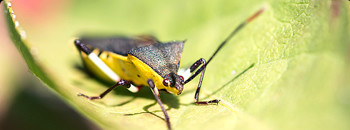As summer approaches, parents are quickly planning their kid’s summer activities. For many, this includes packing their bags and heading to summer camp – the ultimate place for scavenger hunts, swimming, and other fun outdoor activities. But, campers may meet more than a new bunkmate during their stay.
Tiny, yet harmful, pests thrive in the abundance of trees, tall grass and water-filled camp gear like pool covers, water toys or mud puddles.
“Mosquitoes are the first type of pest parents think of when they drop their kids off at camp because of diseases like West Nile,” says Elizabeth Mayne, Program Supervisor for the Cheshire Parks & Recreation. Ticks can also transmit serious diseases, like Lyme disease, and their tiny size can make them hard to spot. According to the Northeastern IPM Center, “schoolchildren are at higher risk than the general population for the tick bites” that transmit disease.
To help today’s campers combat unwanted pests, we’re sharing tips to help parents keep watch for ticks and mosquitoes as their kids head out to explore the outdoors.
- Check Your Kids Before and After Camp: Mayne strongly encourages parents to check their kids for ticks before dropping them off at camp. “I’ve seen kids show up to camp with ticks already on them,” says Mayne. Keep this tick check card handy to make sure you’re looking in these pests’ favorite hiding places. And always check your kids for any ticks or mosquito bites when you pick them up, as well.
- Know Where Your Kids Spent the Day: Ticks and mosquitoes love tall grass and wooded areas, so get familiar with your family’s camp schedule. Tuck a note in their socks to say, “I love you,” but also remind them to be extra diligent with tick checks and their bug-repellent on days where activities include hiking and other outdoor activities in the woods or thick fields.
- Don’t Be Afraid, Be Aware: Educating and communicating bug and bite prevention facts with kids before and during camp can also help in detecting their presence and any bites sooner rather than later. While outdoors, Mayne tells her kids “if you see a bug on you, tell me.” From ladybugs to caterpillars, there are many bugs that are harmless, but it never hurts to have your camp counselor or nurse double-check. And, every time they see a new bug it serves as an educational opportunity.
- Dress for Camp Success: Parents should remember to pack their kids light-colored clothing and breathable jackets and pants, especially for them to wear when dusk rolls around. Tank tops and shorts provide a dinner buffet for mosquitoes, so covering up exposed skin will put up a personal barrier.
- Use Proven Methods of Repellent: EPA-approved bug repellent, such as DEET, is proven to prevent tick and mosquito bites. Bug repellent needs to be reapplied according to label directions, so parents should pack it with their kids if they want it reapplied during camp hours. Remember to apply sunscreen first before bug repellent.
The summer months may be the prime time for ticks and mosquitoes, but that shouldn’t keep kids from spending a fun-filled summer experiencing the outdoors. With frequent bug bite checks, your kid’s camp schedule, repellent and general understanding of what to watch for, pests won’t stand a chance this summer.

